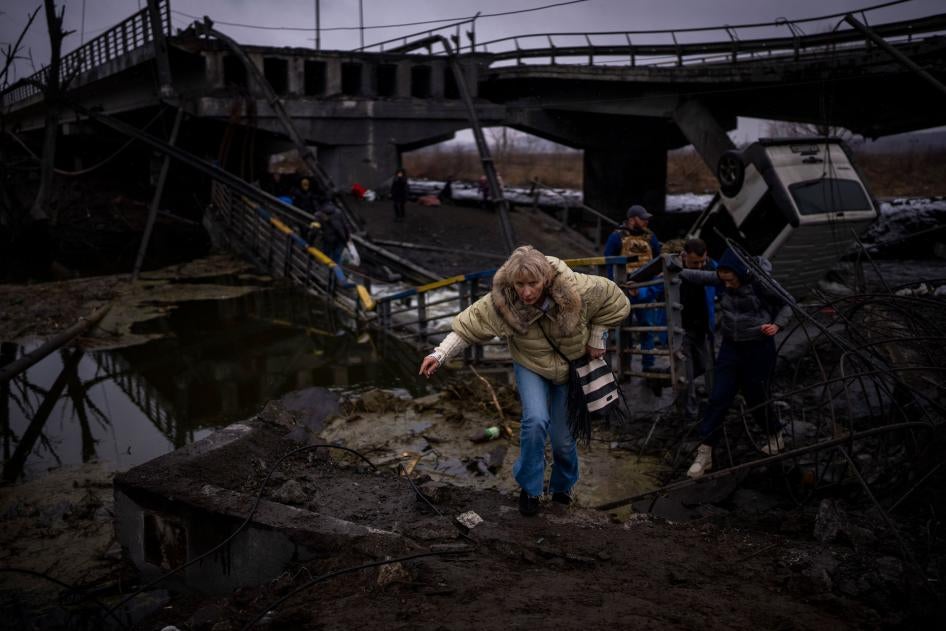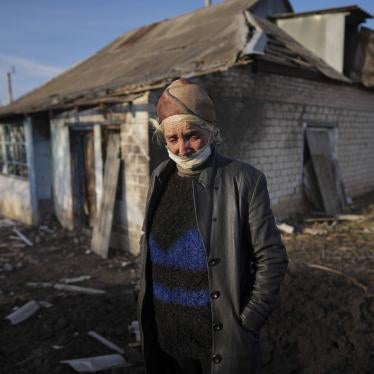As Russian forces invading Ukraine confront stronger and more effective resistance than the Kremlin probably anticipated, the big question is: what comes next. The Russian military has a history of meeting such resistance with serious violations of the laws of war, including deliberately targeting civilians and subjecting them to indiscriminate and disproportionate attacks.
Between 2015 and 2016, Russian and Syrian bombing largely devastated opposition-held parts of eastern Aleppo, the country’s largest city by population. With the residents suffering under a punishing siege as well as indiscriminate attacks with cluster munitions and barrel bombs, incendiary weapons, and high explosive bombs, opposition forces ultimately surrendered.
Russian forces repeated the same tactics later on, in Eastern Ghouta and Idlib, with equally devastating results. They deliberately bombed hospitals, markets, schools and apartment buildings, in some cases repeatedly. The aim was to make life so difficult for civilians that they would leave, isolating opposition forces and making it easier for Syrian ground troops to move in.
Yet in Aleppo and Idlib, Russian forces operated mainly from the sky. With Russian ground forces engaged in Ukraine, perhaps the closest analogy to today’s situation was the second war in Chechnya between 1999 and 2000, when Russian forces utterly devastated the capital, Grozny, with an overwhelming display of indiscriminate firepower. In 2003, the United Nations reportedly called Grozny “the most destroyed city on Earth”. Russian forces also perpetrated several massacres, tortured and forcibly disappeared thousands, and engaged in other grave abuses in “mop-up” operations.
Already there are signs that Russian forces in Ukraine are moving in a similarly indiscriminate direction, but these are early days. Russian forces in the east have used cluster munitions, which endanger civilians not only in their initial use, but also in the substantial unexploded ordnance that they leave behind. Although neither Russia nor Ukraine has joined the treaty banning cluster munitions, these attacks violate the prohibition of indiscriminate warfare, a longstanding part of customary international law codified in the Geneva conventions and their protocols, which both governments have ratified.
In addition, firing ballistic missiles and rocket artillery, Russian forces are using explosive weapons with wide-area effects that are utterly inappropriate in populated areas. And they may be moving to encircle, and impose a siege, on the capital, Kyiv, and the second largest city, Kharkiv. Although sieges are a lawful tactic, they can set the stage for other serious abuse of civilians in the besieged area.
So what can be done to stop a worsening spiral of indiscriminate warfare that would endanger countless Ukrainian civilians? Much has been made of how the many social media postings of attacks could serve as a deterrent by documenting and publicising any war crimes. But the attacks in Syria were also dutifully documented by video and disseminated on social media without sufficient effect.
In the case of Idlib, international pressure did work to stop the targeted bombing of civilian structures. Military pressure from Turkish drone attacks on Syrian forces, diplomatic pressure from the French president, Emmanuel Macron, and the then German chancellor, Angela Merkel, and repeated denunciations from UN security council members succeeded in halting the Russian attacks in March 2020. They have, largely, not resumed.
But the political stakes are higher in Ukraine, where Putin’s legacy is now at stake. And far more intense pressure has already been put on the Kremlin.
The prospect of international prosecution for war crimes remains a potential moderating factor. Because Syria never joined the international criminal court (ICC), the court has not had jurisdiction over serious crimes committed there. The UN general assembly did establish a Geneva-based body to collect and preserve evidence of serious crimes. It has contributed to national prosecutions of Syrian officials, particularly in Germany, under the concept of universal jurisdiction. But even though Human Rights Watch traced command responsibility for the war crimes in Idlib all the way to Putin, no Russian official has been charged. It is not too late to start.
More to the point, the ICC has jurisdiction over serious crimes committed in Ukraine under declarations filed by the Ukrainian government. Already the ICC prosecutor has announced an investigation, and 39 court members are backing him. The international community should now ensure that this investigation, and the court’s broader work, are fully resourced.
Ultimately, the most powerful deterrent of atrocities by the Russian military may be the Russian people. Tens of thousands of Russians have taken to the streets in protest, despite a great likelihood of arrest. More than a million people have signed an anti-war petition, and various prominent people – artists, musicians, academics, writers – have signed open letters against the war.
Emergency discussions on Ukraine at the UN general assembly and the UN human rights council are in the process of yielding global condemnation and the creation of a special mechanism to monitor, report on, and gather evidence of war crimes in Ukraine. These UN bodies should establish a similar mechanism for repression in Russia as well. By the same token, as the world’s governments impose targeted sanctions on people with complicity in the war and repression, they should avoid as much as possible harming ordinary Russians. Standing with the Russian people as they attempt to rein in Putin’s brutal tactics may be the best tool we have for preventing Kyiv and Kharkiv from becoming the next Aleppo and Grozny.









